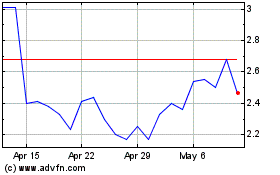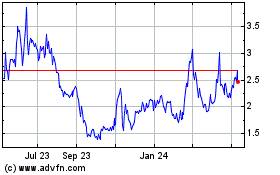Lyell Immunopharma, Inc. (Nasdaq: LYEL), a clinical‑stage T-cell
reprogramming company advancing a diverse pipeline of cell
therapies for patients with solid tumors, is presenting new
nonclinical data at the 38th Annual Meeting of the Society for
Immunotherapy of Cancer (SITC) on innovations designed to shorten
tumor infiltrating lymphocyte (TIL) manufacturing, LYL119, its
second generation ROR1-targeted CAR T cell product candidate, as
well as data on new technologies and the design of its two clinical
trials in progress.
“We remain confident that generating T cells
with the ability to resist exhaustion and qualities of durable
stemness will unlock the potential of effective cell therapy for
solid tumors, and our SITC presentations highlight the progress we
are making across our robust pipeline of product candidates and
platform technologies designed to achieve this,” said Gary Lee,
Ph.D., chief scientific officer at Lyell. “We also highlight new
data on our Epi-R P2 manufacturing process, a manufacturing
innovation designed to enable faster delivery of TIL product to
patients without sacrificing the desired yield, stemness phenotype
and retention of tumor reactive clones.”
Details on the presentations are below.
New Nonclinical Data on LYL119, Innovation in
Manufacturing and New Technologies
Four presentations highlight new nonclinical data from Lyell’s
product pipeline and research programs, including:
- Lyell’s novel Epi-R™ P2 manufacturing protocol to shorten
delivery time of TIL product to patients
- New nonclinical data on LYL119, Lyell’s second-generation
ROR1-targeted CAR T-cell therapy
- A new technology being advanced through a collaboration between
Lyell and Outpace to enable tumor-restricted IL-12 activity to
enhance solid tumor T cell therapies
- Lyell’s rejuvenation technology which has shown the potential
to “turn back” the epigenetic clock to generate more stem-like T
cells with reduced epigenetic age and enhanced proliferation
ability
A presentation titled “Epi-R P2 protocol produces a scalable
polyclonal TIL product with a greater expansion success rate across
hot and cold tumors in shorter culture time” highlights Lyell’s
Epi-R P2 manufacturing protocol that shortens manufacturing time
for TIL while maintaining the desired yield, stemness phenotype and
retention of tumor reactive clones. Current TIL production time is
approximately four to six weeks. Literature suggests that a shorter
culture time is associated with improved cell quality,
functionality and positive clinical outcomes in metastatic melanoma
patients. Lyell’s Epi-R manufacturing protocols are designed to
generate populations of TIL with stem-like properties to
potentially improve antitumor activity. Epi-R P2 is an improved TIL
manufacturing process that reduces the TIL culture duration to less
than three weeks without impacting the quality of TIL.
- Presentation details: Abstract # 379, Friday, Nov. 3, 12–1:30
p.m. and 5:10–6:40 p.m.
New nonclinical data on LYL119, Lyell’s second-generation
ROR1-targeted CAR T-cell therapy, is highlighted in a presentation
titled “Preclinical development of LYL119, a ROR1-targeted CAR
T-cell product incorporating four novel T-cell reprogramming
technologies to overcome barriers to effective cell therapy for
solid tumors.” LYL119 incorporates four of Lyell’s complementary,
stackable T-cell reprogramming technologies to create potent
ROR1-targeted CAR T cells with durable function. In this study,
LYL119 demonstrated superior cytotoxicity and sustained cytokine
production upon repeated antigen stimulation compared to various
controls lacking one or more of the reprogramming technologies and
showed robust in vivo antitumor efficacy in a mouse xenograft tumor
model at very low cell doses.
- Presentation details: Abstract #278, Saturday, Nov. 4,
2023, 11:55–1:25 p.m. and 7–8:30 p.m.
A presentation titled “Protein design and
inducible expression allow context-dependent, localized IL-12
activity to enhance solid tumor T cell therapies” highlights
an innovative tumor-restricted IL-12 (trIL-12) technology that
delivers potent IL-12 stimulation at the tumor site while avoiding
systemic exposure. IL-12 is an immune-stimulatory cytokine that can
induce potent anti-tumor activity, but systemic delivery of IL-12
has been shown to cause severe toxicity in patients. trIL-12 was
designed leveraging Outpace’s OutSmart™ technology to rapidly
auto-inactivate IL-12 after inducible secretion from engineered T
cells with the aim of achieving safe, local delivery of IL-12
activity. trIL-12 is being advanced under a collaboration between
Lyell and Outpace with the goal of improving efficacy for T-cell
therapies while maintaining a favorable safety profile.
- Presentation details: Abstract #1047, Friday, Nov. 3,
12–1:30 p.m. and 5:10–6:40 p.m.
A presentation titled “Rejuvenation of tumor-infiltrating
lymphocytes (TIL) through Partial Reprogramming” describes Lyell’s
rejuvenation technology which has shown the potential to “turn
back” the epigenetic clock to generate more stem-like T cells with
reduced epigenetic age and enhanced proliferation ability.
Previously published studies have demonstrated the decline in
T-cell function as a person ages. These new nonclinical data show
TIL rejuvenated with Lyell’s technology retain a broad TCR
repertoire and demonstrate improved T-cell function and antitumor
properties.
- Presentation details: Abstract #393, Friday, Nov. 3, 2023,
12–1:30 p.m. and 5:10–6:40 p.m.
Clinical Trials in Progress
Two additional presentations highlight the
design of Lyell’s two ongoing Phase 1 clinical trials in
progress.
A presentation titled “Phase 1 trial of LYL797, a ROR1-targeted
CAR T-cell therapy enhanced with genetic and epigenetic
reprogramming, in advanced triple-negative breast cancer (TNBC) and
non-small cell lung cancer (NSCLC)” describes the design of this
dose-escalation, dose-expansion Phase 1 trial in patients with
ROR1-positive relapsed refractory TNBC and NSCLC.
- Presentation details: Abstract #754, Saturday, Nov. 4, 2023,
11:55–1:25 p.m. and 7–8:30 p.m.
A presentation titled “Phase 1 trial of LYL845, an autologous
tumor-infiltrating lymphocyte (TIL) therapy enhanced with
epigenetic reprogramming, for the treatment of advanced solid
tumors” describes the design of this dose-escalation,
dose-expansion Phase 1 trial in advanced solid tumors, including
advanced melanoma, NSCLC and colorectal cancer
- Presentation details: Abstract #747, Friday, Nov. 3, 2023,
12–1:30 p.m. and 5:10–6:40 p.m.
About Lyell Immunopharma,
Inc.
Lyell is a clinical-stage T-cell reprogramming
company advancing a diverse pipeline of cell therapies for patients
with solid tumors. Lyell is currently enrolling a Phase 1 clinical
trial evaluating a ROR1-targeted CAR T-cell therapy in patients
with relapsed refractory triple-negative breast cancer (TNBC) and
non-small cell lung cancer (NSCLC) and a second Phase 1 clinical
trial evaluating reprogrammed tumor infiltrating lymphocytes (TIL)
in patients with advanced melanoma, NSCLC and colorectal cancer.
The technologies powering its product candidates are designed to
address barriers that limit consistent and long-lasting responses
to cell therapy for solid tumors: T-cell exhaustion and lack of
durable stemness, which includes the ability to persist and
self-renew to drive durable tumor cytotoxicity. Lyell is applying
its proprietary ex vivo genetic and epigenetic reprogramming
technologies to address these barriers in order to develop new
medicines with improved durable clinical outcomes. Lyell is based
in South San Francisco, California with facilities in Seattle and
Bothell, Washington. To learn more, please visit www.lyell.com.
Forward Looking Statements
This press release contains forward-looking statements within
the meaning of the Private Securities Litigation Reform Act of
1995. Forward-looking statements expressed or implied in this press
release include, but are not limited to, statements regarding:
Lyell’s anticipated progress, business plans, business strategy and
planned clinical trials; the growing pipeline and potential
clinical benefits and therapeutic potential of Lyell’s product
candidates; the features of and potential for the Epi-R P2
manufacturing process to shorten manufacturing time for TIL while
maintaining the desired yield, stemness phenotype and retention of
tumor reactive clones; Lyell’s collaboration with Outpace Bio and
the potential to enable context-dependent, localized IL-12 activity
to enhance solid tumor T cell therapies and improve efficacy for
T-cell therapies while maintaining a favorable safety profile; the
potential for Lyell’s stackable T-cell reprogramming technologies
to create potent ROR1-targeted CAR T cells with durable function;
the potential for Lyell’s rejuvenation technology to “turn back”
the epigenetic clock to generate more stem-like T cells with
reduced epigenetic age and enhanced proliferation availability of;
and other statements that are not historical fact. These statements
are based on Lyell’s current plans, objectives, estimates,
expectations and intentions, are not guarantees of future
performance and inherently involve significant risks and
uncertainties. Actual results and the timing of events could differ
materially from those anticipated in such forward-looking
statements as a result of these risks and uncertainties, which
include, but are not limited to, risks and uncertainties related
to: macroeconomic conditions and the lingering effects of the
COVID-19 pandemic; geopolitical instability; Lyell’s ability to
submit planned INDs or initiate and execute clinical trials on the
anticipated timelines, if at all; Lyell’s limited experience as a
company in enrolling and conducting clinical trials, and lack of
experience in completing clinical trials; Lyell’s ability to
manufacture and supply its product candidates for its clinical
trials; the nonclinical profiles of Lyell’s product candidates not
translating in clinical trials; the potential for results from
clinical trials to differ from preclinical, early clinical,
preliminary or expected results; significant adverse events,
toxicities or other undesirable side effects associated with
Lyell’s product candidates; the significant uncertainty associated
with Lyell’s product candidates ever receiving any regulatory
approvals; Lyell’s ability to obtain, maintain or protect
intellectual property rights related to its product candidates; the
sufficiency of Lyell’s capital resources and need for additional
capital to achieve its goals; and other risks, including those
described under the heading “Risk Factors” in Lyell’s Annual Report
on Form 10-K for the year ended December 31, 2022, filed with the
Securities and Exchange Commission (SEC) on February 28, 2023, and
the Quarterly Report on Form 10-Q for the quarter ended June 30,
2023, filed with the SEC on August 8, 2023. Forward-looking
statements contained in this press release are made as of this
date, and Lyell undertakes no duty to update such information
except as required under applicable law.
Contact:
Ellen RoseSenior Vice President, Communications
and Investor Relationserose@lyell.com
Lyell Immunopharma (NASDAQ:LYEL)
Historical Stock Chart
From Oct 2024 to Nov 2024

Lyell Immunopharma (NASDAQ:LYEL)
Historical Stock Chart
From Nov 2023 to Nov 2024
